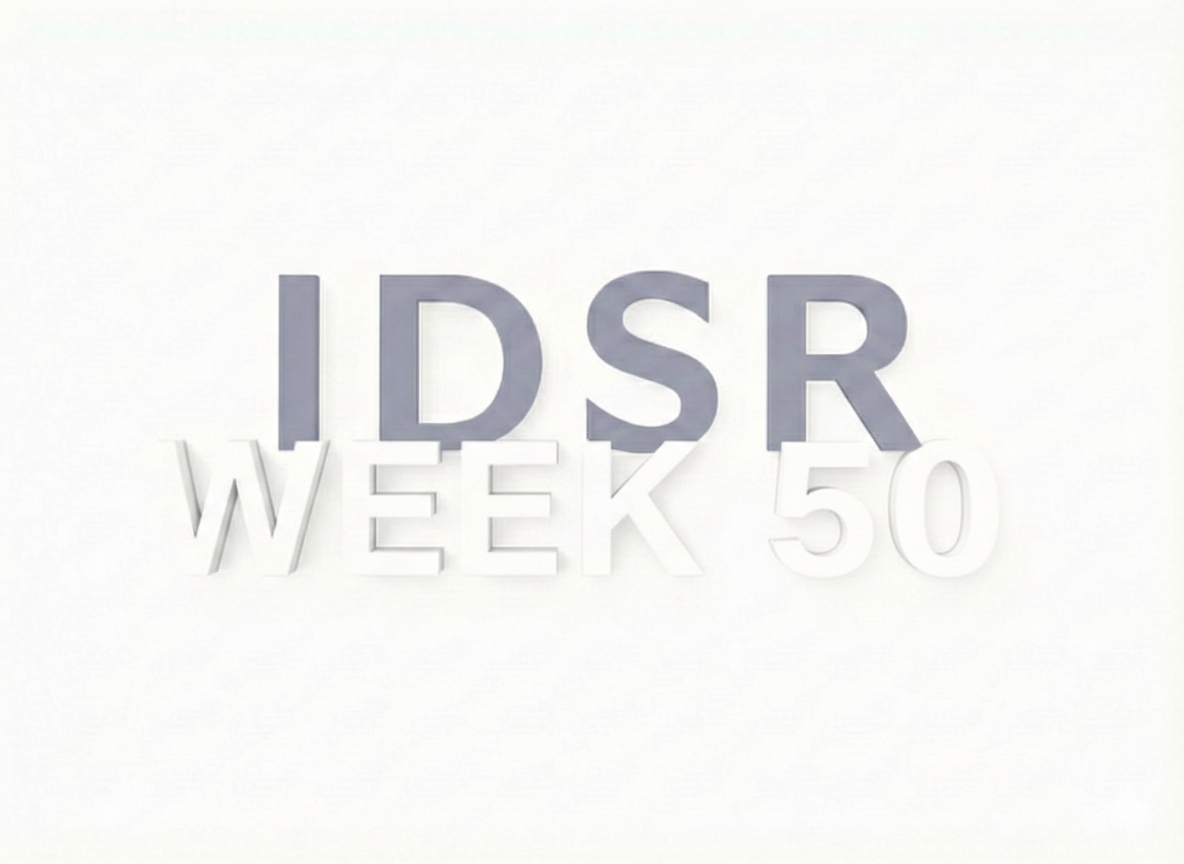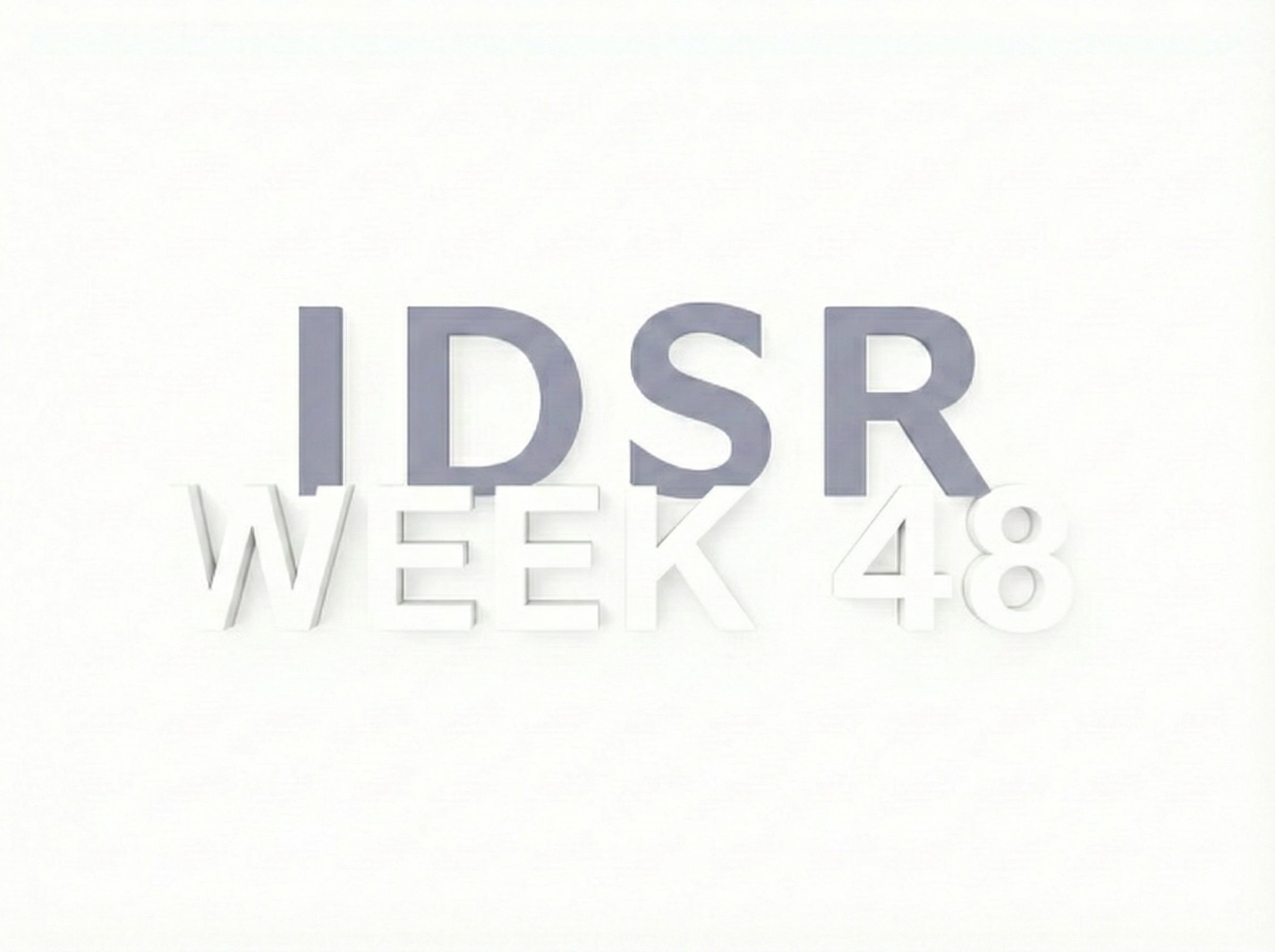Editorial Team
Weekly IDSR Bulletin
Epidemiological Week 50 (8-14 December, 2025)
Published By
Moses Nyambalo Phiri
Public Health Institute of Malawi

Editorial Team
Epidemiological Week 50 (8-14 December, 2025)
Published By
Moses Nyambalo Phiri
Public Health Institute of Malawi

Editorial Team
Epidemiological Week 48 (24-30 November, 2025)
Published By
Moses Nyambalo Phiri
Public Health Institute of Malawi
In Week 48, the Integrated Disease Surveillance and Response (IDSR) system faced significant challenges. Reporting rates dropped considerably, with national completeness falling to 71.3% and timeliness to 68.1%, well below the 80% target. This requires urgent administrative attention.
Malaria remains the highest burden with 14,011 cases and 7 deaths. Alerts for Typhoid Fever (37 cases, 1 death) and SARI (61 cases, 2 deaths) highlight ongoing public health risks.
One new confirmed Mpox case was reported in Week 48. Cumulative cases now total 140. Surveillance remains high to detect any new chains of transmission.
Measles outbreak clusters have reached a total of 130 cases. While new cases in Balaka have plateaued, Machinga and Dowa reported increases.
21 signals were reported this week. 8 signals (38%) were verified as genuine events, with 4 classified as High Risk.
21 signals reported (Decrease from 39 in Wk 46).
8 signals (38.1%) verified as genuine public health events.
4 High Risk events identified requiring urgent intervention.
© 2025 Public Health Institute of Malawi. All Rights Reserved.

By Moses Nyambalo Phiri | In collaboration with Andrew Hyroba, Amp Health

Building on the momentum established in May 2025 in a three-day Co-creation and Leadership Training Workshop sponsored by the Task Force for Global Health (TFGH) and facilitated by AMP Health, the Public Health Institute of Malawi (PHIM) reconvened on November 12-14, 2025 for a critical follow-up Leadership Skills Workshop to review progress and strategize for the upcoming Global Fund’s funding cycle. As reported in our previous coverage (Co-creation and Leadership Training Workshop), PHIM embarked on a transformative partnership with AMP Health through the SONAR Task Force for Global Health (TFGH) six months ago to enhance its leadership and management capacity to efficiently and effectively deliver program.
Held at the Eden Estates Hotel, the initial co-creation workshop was rooted in the premise that effective leadership and management of disease surveillance and response initiatives are critical to the maintenance of public health security. The initial workshop aimed at addressing systemic challenges in coordination and established shared goals for the June-December period, specifically designed to fast-track programs financed by the Global Fund. The workshop brought together experts from AMP Health and the SONAR Initiative to help PHIM leadership identify key actions in training, supervision, and data management, setting the stage for the work that has continued throughout the year.
The second and final workshop of this series took place from 12-14 November 2025, returning to the Eden Estate & Resort outside Lilongwe. The event saw robust attendance from all three major PHIM departments—Surveillance, Lab, and Research—along with Acting PHIM Director Ms. Dimba Flora and key chiefs responsible for executing PHIM’s mandate.
The primary objective was to review the progress made over the last six months and specifically address the utilization of the Global Fund (GF) grant which concludes in December 2025. Dr. Alphonse Acho, Regional Advisor for the SONAR initiative, emphasized the critical need to demonstrate efficient grant utilization to demonstrate PHIM’s capability to effectively manage and implement grants. The agenda reflected a “deep-dive” into PHIM’s spend rates and the progress against the four priority goals established in May.
One of the most significant outcomes of the workshop was the observation that three – Surveillance, Research, PHIM’s visibility – out of the four set priorities had over 100% achievement rates, while one was reprioritized based on the evolving dynamics on the ground. Some of these achievements were realized in light of delayed access to resources from the Global Fund.
A pivotal moment occurred when data showed that the Surveillance department had utilized approximately 50% of their grant allocation in a six-month period, compared to 21% over the previous 2 ½ years – a 29% utilization in 6-months. Research achieved a remarkable 100% utilization in the same period, and the Laboratory increased utilization from 47% to 56% during the six-month acceleration phase.
The workshop reinforced PHIM’s leadership’s emphasis of the benefits of cross-departmental collaboration, working in a resource-constrained environment, leveraging delegation of responsibilities to achieve greater impact and adopting an advocacy approach to driving performance as well as delivering results. Learning from each other’s strategies that led to these achievement rates, the teams shared the successful approaches and resolved to hold regular joint meetings to improve internal communications, demonstrating a cultural shift towards unified action.

“The culmination of this shared learning was a mutual resolution: the departments committed to holding regular joint meetings and drastically improving internal communications. This isn’t just a policy change; it’s a cultural pledge to never return to the days of working in isolation.”

Beyond strategic planning, the workshop focused on practical leadership skills. Participants engaged in leadership and management simulation exercises, team-building exercises aimed at improving team coordination, team effectiveness, problem-solving and using data for decision-making. The final day involved essential training on handling difficult conversations and feedback, empowering team members to address operational bottlenecks—such as delays with the Principal Recipient (PIU)—more effectively.

“Difficult conversations” often centered on critical operational bottlenecks that risked the loss of grant funds. This included addressing issues like delayed sign-offs on procurement from other Principal Recipient (PR) units. The training provided PHIM leaders with structured frameworks, like the SBI (Situation-Behavior-Impact) model, to deliver feedback constructively and negotiate solutions with external partners without resorting to blame, ensuring swift resolution to logistical impasses. This skill was vital for accelerating utilization of Global Fund resources by proactively clearing these administrative hurdles.
The workshop concluded with a “commitment circle” where the team prioritized practical, actionable steps to sustain these behavioral changes. With clear priority areas now identified and a stronger, more unified team structure in place, PHIM is better positioned to maximize the remaining time with their management partners and demonstrate tangible impact to global funders.